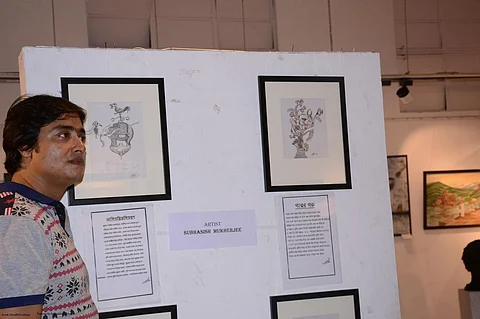
- Home
- न्यूजग्राम
- India
- World
- Politics
- Entertainment
- Culture
- Lifestyle
- Economy
- Sports
- Sp. Coverage
- Misc.
- NewsGram Exclusive
- Jobs / Internships

By Roshni Chakrabarty and Arnab Mitra
Kolkata: Paintings by Subhasish Mukherjee, winner of 'Mirakkel Season 7', are on display from November 7-14 at the Pratibha Art Gallery in the Academy of Fine Arts. 'Mirakkel' is a Bengali stand-up comedy show hosted by RJ and comedian Mir Afsar Ali, and featured on TV channel Zee Bangla. The exhibition, inaugurated by famed artist Samir Aich, showcases satirical pen sketches by Mukherjee.
The artist spoke to NewsGram on art, the relevance of language and Bengali comedy shows.
NG: You have added a Bengali poem at the bottom of each of your paintings. Say something on this unusual measure.
SM: Most people who come to see paintings appreciate them, but fail to understand their inherent meaning. Viewers must understand what the artist is trying to portray through their work, and the poems I added makes this process easier. It increases the viewability and understandability of the work.
People now neglect Bengali to a huge extent. School going students avoid using the language and some even proudly proclaim that they don't read Bengali books or that they aren't familiar with the works of Rabindranath. So, I have chosen to write the poems in my native tongue- Bengali, an effort to make more people come into contact with the language. If anyone is unable to understand what is written, I am always ready to explain the words in English or Bengali as required.
NG: Do you think the younger generation watches Bengali comedy shows such as Mirakkel or are they only interested in Hollywood and Bollywood films?
SM: Language is not a barrier when it comes to art, films, and music. Art has its own language. If I am listening to a song from the North East, I won't understand the language, but I might very well love the music.
I don't believe that the younger generation don't watch Bengali shows or don't like Bengali at all. I think which language one prefers is a personal choice. It varies from person to person according to their mindset.
But it's true that English and Hindi have become a trend now. To communicate with most of the Indian mass, one must be well versed in either of these two languages as the vast majority speaks in them and no one can be blamed for this.
NG: Do you believe that great Bengali scholars such as Rabindranath Tagore and Sarat Chandra Chattopadhyay are not in relevance with the younger generation anymore, even though, at times they show an apparent pride in donning a kurta-pyjama on 25th Baishakh (Rabindranath's birthday) or in keeping a copy of Gitanjali on their bookshelf?
SM: It is certainly a dangerous situation when people grow distant from their own roots and blindly try to follow a different culture. Such a state of affairs is also present outside Bengal. However, I believe that if a certain family decides to remain in touch with their roots and educates their children on their own culture with the help of the literature in their mother tongue, the younger generation is bound to stay in touch as well.
This obsession with the foreign culture has been around for ages and people are very proud if they get accepted in foreign universities such as Oxford or Harvard. The situation has grown all the more due to globalization, but it doesn't mean that people have forgotten the likes of Rabindranath or Sarat Chandra.
NG: Are all the jokes delivered on Mirakkel your own work or do you take the help of other resources?
SM: Every joke and item presented on Mirakkel is not original. We often take ideas from Hindi movies or English comedy shows and translate them. However, it is true that often in the process of copying and translating jokes or other items, the original flavor of the piece is lost.
Mirakkel receives a very good response in Bangladesh. It is an amazing country and the people there are very sensitive towards their language. There are no such issues of language over there, such as the undue influence of English or Hindi. Most follow only Bengali.
NG: Do you think that, as a result of globalization, people have started to emulate the West even in matters of art?
SM: As I said before, art has its own language. An artiste's style depends upon the artiste himself. Some might decide to be copycats, but painting, dance, music are all art-forms which come from a creative essence within us. The process isn't meant to be mugged up or emulated.
Such is the western influence on our culture, be it in films, literature, music or art, that even if my own work is at par with that of an Italian painter exhibiting here, it is him who would receive more appreciation from the general public just because of his Western origin.
However, if I decide to copy Picasso's style and his brushstrokes, that won't make me Picasso. I don't know if what I do is a western form or an Indian form. All I know is that I work with love and passion and with my own form—the Subhasish form (he laughs).
